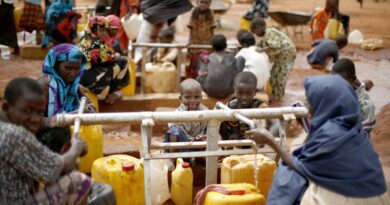Privileged few key drivers of urban water crises worldwide

Social inequalities are driving urban water crises more than environmental factors, such as climate change or the growth of urban populations, a new research study led by Sweden-based Uppsala University, has found.
Rich elites with large swimming pools and well-maintained lawns are leaving poorer communities without basic access to water in cities across the world, the study noted.
In the first two decades of the 20th Century, as many as 79 cities across the world have suffered acute water shortages due to continuous growth in demand as well as the impacts of climate change. Traditional explanations of these crises point to the continuous growth of urban areas, both through population growth and economic growth, as well as changes in the water cycle that reduce the predictability and reliability of existing water supply systems.
However, the study shows how social inequalities across different groups play a major role in the manifestation of these crises: the researchers explain urban water crises as being generated by asymmetric power relations and come to the conclusion that water crises such as that experienced by the city of Cape Town are also a result of the unsustainable practices of the elite.
“Our study argues that the only way to preserve available water resources is by altering privileged lifestyles, limiting water use for amenities, as well as redistributing income and water resources more equally. Future water security and drought resilience strategies should be more proactive and able to recognise and address the long-term inequalities and unsustainable patterns that have engender urban water crises like the one in Cape Town”, said Dr Elisa Savelli of the Department of Earth Sciences at Uppsala University who led the study.
The study, recently published in Nature Sustainability, was made with colleagues at Vrije Universiteit Amsterdam, Netherlands; the University of Manchester, UK and University of Reading, UK.
The researchers have developed a model to analyse the domestic water use of urban residents in Cape Town, South Africa to understand how different social classes consume water. They found that urban elites overconsume water for their own personal leisure, such as filling their swimming pools, watering their gardens or washing their cars.
The model includes five social groups, ranging from ‘elite’ (people who live in spacious homes with large gardens and swimming pools) to ‘informal dwellers’ (people who tend to live in shacks at the edge of the city).
Elite and upper-middle-income households make up less than 14 per cent of Cape Town’s population but use more than half (51 per cent) of the water consumed by the entire city. Informal households and lower-income households account for 62 per cent of the city’s population, but consume just 27 per cent of Cape Town’s water.
The research team focused on the unequal metropolitan area of Cape Town, where a severe drought unfolded into an unprecedented water crisis, widely known as Day Zero. The model simulates the uneven water consumption across Cape Town’s different social groups before, during, and after the occurrence of the drought.
The model’s results indicate that low-income residents are significantly more vulnerable to drought and water crises than the elite, who can afford tariff increases, as well as access and develop alternative water sources.
The researcher also highlighted similar issues in 80 cities worldwide, including London, Miami, Barcelona, Beijing, Tokyo, Melbourne, Istanbul, Cairo, Moscow, Bangalore, Chennai, Jakarta, Sydney, Maputo, Harare, Sao Paulo, Mexico City and Rome, said an official statement.



